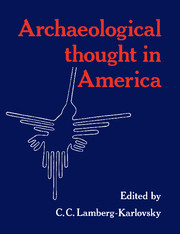Book contents
- Frontmatter
- Contents
- List of illustrations
- Introduction
- Part I History, method, and theory
- Part II Archaeology in the Americas and beyond
- 9 The structural analysis of Paleolithic art
- 10 Ancient China and its anthropological significance
- 11 Settlement pattern studies and evidences for intensive agriculture in the Maya Lowlands
- 12 The political economy of the Inka empire: the archaeology of power and finance
- 13 An epigenetic view of the Harappan culture
- 14 The use and abuse of world systems theory: the case of the “pristine” West Asian state
- 15 Mesopotamia, Central Asia and the Indus Valley: so the kings were killed
- 16 New tracks on ancient frontiers: ceramic technology on the Indo-Iranian Borderlands
- 17 Pastoralism and the early state in Greater Mesopotamia
- References
- Index
10 - Ancient China and its anthropological significance
Published online by Cambridge University Press: 06 July 2010
- Frontmatter
- Contents
- List of illustrations
- Introduction
- Part I History, method, and theory
- Part II Archaeology in the Americas and beyond
- 9 The structural analysis of Paleolithic art
- 10 Ancient China and its anthropological significance
- 11 Settlement pattern studies and evidences for intensive agriculture in the Maya Lowlands
- 12 The political economy of the Inka empire: the archaeology of power and finance
- 13 An epigenetic view of the Harappan culture
- 14 The use and abuse of world systems theory: the case of the “pristine” West Asian state
- 15 Mesopotamia, Central Asia and the Indus Valley: so the kings were killed
- 16 New tracks on ancient frontiers: ceramic technology on the Indo-Iranian Borderlands
- 17 Pastoralism and the early state in Greater Mesopotamia
- References
- Index
Summary
In demanding that humankind be examined not merely in a single manifestation but “in all its variation” (Kluckhohn 1955:320), American anthropology has as one of its main objectives the formulation of true universals that may exist in the process of the evolution of cultures and societies. In this regard one of the major accomplishments of American anthropology is in our understanding of how civilizations arose in the New World as an indigenous and independent process and of how this process both resembles and differs from similar processes in the Old World. An examination of the ancient Chinese civilization serves a similar purpose.
Ancient China is unique for the study of cultural and social evolution, for only in this area of the world do we have at our disposal a combination of several kinds of data that are not available together elsewhere: abundant archaeological material, mostly brought to light in the last thirty to forty years; enormous quantities of textual and inscriptional material left from and pertaining to the earliest Chinese civilizations; and a vast continuum of history from the first civilizations to the present day, which provides us with endless opportunities to apply the methods of ethnoarchaeology and the direct historical approach. From these sources a reasonably complete picture of the beginning of Chinese civilization has now emerged.
Beginning of Chinese civilization
Authentic written records from ancient China begin with the Shang (c. 1750–1100 B.C.) and Zhou (c. 1100–220 B.C.) dynasties, and both dynasties have been archaeologically substantiated (see, e.g., Chang 1980).
- Type
- Chapter
- Information
- Archaeological Thought in America , pp. 155 - 166Publisher: Cambridge University PressPrint publication year: 1989
- 18
- Cited by



